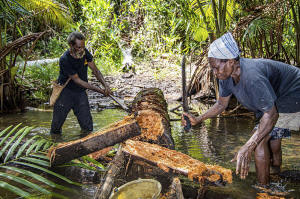World's largest deforestation project fells forests for bioethanol fuel,
sugar and rice in Indonesia
[April 07, 2025] By
VICTORIA MILKO
JAKARTA, Indonesia (AP) — Indonesia plans to clear forests about the
size of Belgium to produce sugarcane-derived bioethanol, rice and other
food crops, potentially displacing Indigenous groups who rely on the
land to survive.
Local communities say they’re already experiencing harm from the
government-backed project, which environmental watchdogs say is the
largest current planned deforestation operation in the world.
A vast tropical archipelago stretching across the equator, Indonesia is
home to the world’s third-largest rainforest, home to many endangered
species of wildlife and plants, including orangutans, elephants and
giant forest flowers. Some live nowhere else.
Indonesia has been building food estates, massive plantations designed
to improve the country's food security for decades, with varying level
of success. The concept was revived by former President Joko Widodo
during his 2014- 2024 administration.
The current president, Prabowo Subianto, has expanded such projects to
include crops to produce bioethanol, a renewable fuel made from plants
like sugar cane or corn, in pursuit of Indonesia's ambition to improve
its energy mix and develop more renewable sources.
“I am confident that within four to five years at the latest, we will
achieve food self-sufficiency,” Prabowo said in October 2024. “We must
be self-sufficient in energy and we have the capacity to achieve this."

Biofuels, such as bioethanol, play an important role in decarbonizing
transport by providing a low-carbon solution for sectors that heavily
rely on fossil fuels such as trucking, shipping and aviation, according
to the International Energy Agency. But the agency also cautions
expansion of biofuel should have minimal impact on land-use, food and
other environmental factors in order to be developed sustainably.
That's of particular concern in Indonesia, where more than 74 million
hectares (285,715 square miles) of Indonesian rainforest — an area twice
the size of Germany — have been logged, burned or degraded for
development of palm oil, paper and rubber plantations, nickel mining and
other commodities since 1950, according to Global Forest Watch.
Indonesia has vast potential for bioethanol production due to its
extensive agricultural land but currently lacks sustainable feedstocks,
like sugarcane and cassava. A previous attempt to introduce bioethanol-blended
fuel in 2007 was discontinued a few years later due to a lack of
feedstock supply.
Since then, the government has accelerated work on its food and energy
estate mega-project, which spans 4.3 million hectares (about 10.6
million acres) on the islands of Papua and Kalimantan. Experts say the
combined size of the numerous project sites makes the mega-project the
largest current deforestation project in the world.
The largest site, called the Merauke Integrated Food and Energy Estate,
will cover more than 3 million hectares (7.4 million acres) in the
far-eastern region of Papua, according to the international
environmental organization Mighty Earth.
Overlapping with the Trans-Fly ecoregion, it's home to critically
endangered and endemic mammals, birds and turtles and to several
Indigenous groups who rely on traditional ways of living.

[to top of second column] |

In this image provided by Mighty Earth, the head of Kwipalo family
of Papua's Yei tribe, Vincen Kwipalo, 63, left, and his wife
Alowisia Kwerkujai, 58, cut a sago tree to find sago grubs, at a
tribal forest in Jagebob district in Merauke, Papua province,
Indonesia, on March 17, 2025. (Yusuf Wahil/Mighty Earth via AP)
 “Imagine every piece of vegetation
in that area being completely cleared ... having all the trees and
the wildlife erased from the landscape and replaced with a
monoculture,” said Glenn Horowitz, CEO of Mighty Earth. “It’s
creating a zone of death in one of the most vibrant spots on Earth.”
An unpublished government feasibility assessment obtained and
reviewed by The Associated Press estimates that carbon dioxide
emissions from clearing land for the project will total 315 million
tons of C02 equivalent. An independent assessment by the
Indonesia-based think tank Center of Economic and Law Studies
estimated double that.
Deforestation contributes to erosion, damages biodiverse areas,
threatens wildlife and humans who rely on the forest and intensifies
disasters from extreme weather.
Hashim Djojohadikusumo, Subianto's brother and envoy for energy and
the environment, said the government will reforest 6.5 million
hectares (16 million acres) of degraded and deforested land.
“Thus, the food estate program continues while we mitigate the
possible negative impacts with new programs, one of which is
reforestation,” he said.
But experts warn that reforestation, while essential, cannot match
the ecological benefits of old-growth ecosystems, which store vast
amounts of carbon in their soils and biomass, regulate water cycles
and support biodiversity.
Indonesia’s Ministry of Agriculture, which oversees the food and
energy estate project, did not respond to requests for comment from
The AP. Merauke Sugar Group and Jhonlin Group, the two main
Indonesian companies in charge of the project in Merauke, did not
respond to requests for comment from The AP.

Local communities in Papua that rely on the area for hunting,
fishing and other aspects of their cultural identity say their basic
needs have been harmed by the projects.
Vincen Kwipalo, 63, a villager living in the area, said that land he
and other villagers used for hunting was turned into sugarcane
nurseries guarded by groups of men, preventing them from engaging in
their usual ways of surviving.
“We know the forests of Papua are one of the biggest lungs of the
world, yet we are destroying it,” Kwipalo said. “Indonesia should be
proud to protect Papua ... not destroy it.”
Environmental watch groups say the projects' development will impact
generations of Indigenous groups for generations to come
“Where are they going to hunt, fish and live?” said Horowitz. “For
an Indigenous community that's relied on the rainforest to provide
for centuries, are they supposed to live in a sugar plantation?”
All contents © copyright 2025 Associated Press. All rights reserved |